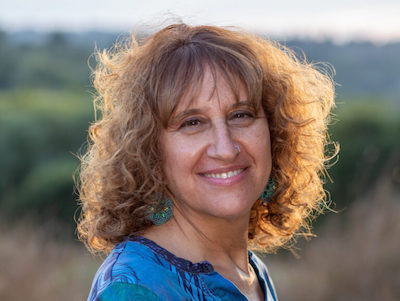
Alissa Hirshfeld is a licensed marriage and family therapist, trained EMDR therapist, and certified spiritual director who specializes in grief/loss and trauma. She began to train in psychedelic-assisted therapy when she saw its power to help her heal after her divorce. She received certification through the California institute of Integral Studies and has undergone training in MDMA-assisted therapy with MAPS and in ketamine-assisted therapy with the Polaris Institute and Temenos Center.
She worked at Hospice By the Bay for 12 years, where she directed the bereavement program and created innovative programs for adults, children and families.
She has authored three books: a memoir describing her personal and professional experience with grief (“This Whole Wide World is Just a Narrow Bridge”), a novel with grief themes (“Living Waters: From Harvard Halls to Sacred Falls”), and “Fury: Women’s Lived Experiences During the Trump Era,” an anthology of essays by a diverse group of women.
She currently has a private practice in Santa Rosa, provides ketamine-assisted psychotherapy at two local clinics, and teaches meditation. She also continues to write and is a visual artist.
More information is available at alissahirshfeld.com.
Sign up for 10% off of Shrink Rap Radio CE credits at the Zur Institute
Podcast: Play in new window | Download
Subscribe: Apple Podcasts | RSS
I was going berserk every time Ms. Hirshfield mentioned ketamine as a psychedelic. It is NOT a psychedelic (acknowledged later in the podcast). It’s a dissociative anesthetic which affects the MDMA receptors (glutamatergic—thus the energy). It is molecularly similar to PCP—which I recognized immediately on my 1st snort of a Spravato inhaler [esketamine formulated by Janssen off the ketamine molecule so it could be patented and marketed at high cost compared to widely available generic ketamine. 21 sessions later, my life had blown up. It ripped away my defenses, made me emotionally vulnerable, and I lost control in social relationships. I KNOW it helps others; it just broke me.
First off, I am very sorry to hear about your experience, Madelon. It is true that ketamine is not effective for everyone. In fact, 70% of patients benefit, which is significantly higher than the response rate to SSRI’s, but means that 30% do not. Having ongoing psychotherapy and integration work, including and perhaps especially for difficult experiences, can help. You also raise important issues in terms of cost of treatment and reimbursement, which are crucial for the field to address, to make these treatments affordable for anyone who wishes to access them. Finally, I’d hoped I’d made it clear when I first mentioned ketamine that it is an anesthesia with psychedelic properties (at sub-anesthetic levels), that as you accurately state, works on the glutamate system. I also at times was speaking of other types of psychedelic therapy. I apologize for any confusion.